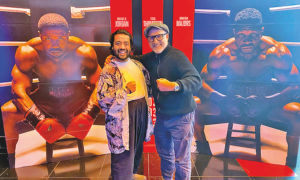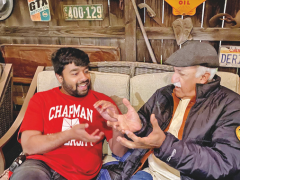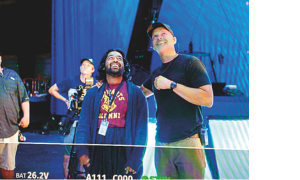
Oct 30 2024.
views 469On the Buzz, I have Rajeev Colton (Wickramaratne) who was born in Colombo, Sri Lanka, but moved to Kandy, where he discovered his first love: movies—thanks to Jurassic Park at age six. From dabbling in theatre as a kid to making award-winning short films in college, Rajeev’s passion only grew.

After earning a BFA in Film from Evangel University and later an MFA from Chapman University, he somehow convinced Marvel Studios that his Sri Lankan charm was just what Captain America: Brave New World needed in a Director's Assistant. Now living in California and hoping to be Sri Lanka’s first Oscar winner, Rajeev’s biggest dream is to return home and level up Sri Lankan cinema… one epic film at a time! And yes, he still thanks Spielberg for the inspiration.
Today he is buzzing with me on all that’s fabulous in Hollywood...
Can you share what inspired your journey from Sri Lanka to Hollywood and how it feels to be working with Marvel Studios on Captain America: Brave New World? I’ve always wanted to be a filmmaker, ever since watching Jurassic Park (my fave of all time) at 6 years-old! I grew up watching Hollywood films thanks to my fab parents, who had acquired a wide variety of VHS tapes, which made me fall in love with the industry even more. I remember getting to watch some local TV (Always Breakdown, Dhaamini and Kopi Kade being the main ones) but didn’t really watch any
local movies, so in my mind, the only logical way forward to get to work in film was to eventually move to Hollywood and work with the greats!
Working on Captain America: Brave New World was and is a dream that is still coming true. I have random moments in my day where it hits me that I got to assist the Director (Julius Onah) on a Marvel Studios movie, and it never ceases to surprise or bring me to tears. It’s been a long, winding road beginning with that 6-year-old who watched Jurassic Park, and I’ve gradually embraced being proud of this and all the things I have achieved along the way too.
Watching Jurassic Park at age six sparked your love for film. How did that early experience influence your path in cinema? At first, it was the thrill of the adventure, all the action and jump-out-of-your-seat moments that hooked me, but by the 100th time I had watched it in the span of a week, I started to see and experience more. The themes of mankind vs nature, family beyond blood, respect for and the understanding of things beyond our control, and the fragility that is us, human beings - all of this and more is why I felt consciously and subconsciously drawn to this film as a young boy, and I KNEW I wanted to spend my life getting to work in and on things that emulated that same experience for others.

How did your experiences with theatre and short films in Sri Lanka shape your approach to storytelling and filmmaking? Working in and on amateur theatre and short films has had a, if not THE most, tremendous impact on me as a storyteller and filmmaker because it taught me to be resourceful and grateful. By working with the bare minimum on all fronts, primarily due to lack of experience, connections, funding and education, I truly had to make the most of what I had and the little I knew. I liken it to a hungry, leashed dog, doing everything it can to break its chain and bust through the window of a restaurant or bakery! To get a taste of not just what I desired, but what is needed! Also, receiving any feedback or criticism from an audience pushed me to fix what was not satisfying their needs/wants, and be more perceptive as a writer.
What were some key takeaways from studying at Evangel University and then Chapman University (which is now the top 4th film school in America) that prepared you for your current role? First of all, I want to say that in this industry, you don’t have to go to film school to make films and be great at it, BUT it is a fast track, provides a safe space to make mistakes and learn from them, and provides you with a solid base of connections. Evangel University and Chapman University (Dodge College provided me with very different sets of skills and tools that I needed when I needed them.) Evangel was my first experience in a semi-professional arena.
Understanding the basics of the industry, how it all works and then slowly figuring out what sort of storyteller I wanted to be is what provided the foundation to get accepted to Chapman University. In doing my Master's, I already came in with a decent idea of what I wanted the path forward to look like, which allowed me to dive in. Here I learned how to talk the filmmaker language with other industry professionals (all our professors worked and/or are working in the industry on movies I grew up watching), broaden my global cinema bank, and deepen and polish the characters we created and the world they lived in. I felt truly prepared to get started!

You’ve had the unique opportunity to work closely with two-time Academy Award winner Asghar Farhadi as his Teaching Assistant during his semester at Chapman. What lessons did you gain from that experience? One of the connections I will cherish forever, and forever will be indebted to Dean Stephen Galloway for selecting me for that position. I gained too much to jot down, so I will share the three main takeaways. 1) Always trust your instinct/spirit. At this point in my life, I had made a few shorts, learned from a lot of mistakes, and banked a lot of stories I was passionate about. The best way to figure out how they are meant to be told and make a mark as a great filmmaker (like Mr. Farhadi) is to trust all that you have done, learned and are passionate about, and cast the line. 2) Your team is your family. Protect them at all costs, allow them to catch your vision (which will make for a better film and even better experience) and share in the victories. And 3) Don’t just tell a story; make a movie! If you look at the great auteurs, they always have a signature with HOW they made their film (the formal design). It’s important to have compelling yet simple characters in high-stakes, complex situations, but your gift to the world through that story is HOW you tell it (visuals, sound, movements, tones, design, etc). Allow yourself to create a signature as a filmmaker, it will carry you forward!
Can you tell us about one of your most memorable projects from your time at Chapman, like Anirudh or Dadu, and what it taught you about the craft? Anirudh is a film very close to my heart and my first professional producing credit, but Dadu (grandfather in Hindi) is the short I am most proud of during my time at Chapman! It was with the same team (and close lifelong friends) from Anirudh and my first exposure to working directly with an A-list actor; the incomparable Brian George. Development and pre-production at this point had become second nature and were going great.
This film is SO well written, as it’s a very personal story for our writer/director (Raghav Puri, who I love and will work with forever), so it was important to me that we picked the perfect Dadu. Our casting director, Russell Boast, presented a few options, with Brian being one of them, and it was a no-brainer who we had to go with. Meeting Brian for the first time was nerve-wracking, as I consider every day an opportunity and audition! Being newer to the game and only having film school as a reference point, I didn’t realize how much more work, professionalism and drive it required working with someone of Brian’s level. He was SO kind, funny, and patient with me as I navigated pushing myself from being a producing student to a film producer. From that point onward, we all came to work and made sure we carried ourselves in that fashion, and it unlocked my understanding of what it meant to be a professional! Brian is still a good friend and I am grateful that he loved this project enough to be our Dadu!

Tell us a bit about your time with Proximity Media and working with Sev Ohanian and Oscar-nominated Ryan Coogler. In the same semester that I was a teaching assistant to Mr. Farhadi AND producing my graduate thesis (Dadu), I was selected to be one of three fiction interns at Proximity Media, an opportunity I was not turning down! Because of this fruit salad, I pushed myself and learned how to manage time and priorities - was I stressed, absolutely… but I would do it all over again because of all the amazing things I got to learn and experience during those 5 months!
Proximity Media at the time was 3 years old and in the middle of filming Creed III, but had one of THE BEST internship programmes! We were constantly reading new material, prepping updates on the trades and in meetings with the executives, getting to pick their brains. God does not make mistakes, and working with Proximity Media was a much-needed education and doorway to where I am today. A huge shoutout to Madi Boll, Desi Gallegos, Nick Lopez and Hannah Baker for leading and teaching us, as well as the genius that is Sev Ohanian.
What does it mean to you to represent Sri Lanka on an international platform, especially in Hollywood? It means a lot more than I thought it did and I can truly say I’ve always been proud to be Sri Lankan! Even though I wanted to move to Hollywood as a kid and “live the dream”, my family constantly reiterated that no matter what or where we end up, we are born Sri Lankan for a reason. I never realized how much I loved that about my identity and how it made me different till I lived abroad for film school and other work.
My love for this country and her stories deepened when I was introduced to the unmatched works of Prasanna Vithanage. I was asked to present about ‘Sri Lankan Cinema’ in one of my producing classes and I studied Ira Madiyama which changed my life. Now, much like Mr. Vithanage, to be someone who has taken the name (and for some, the existence) of our country and still representing it at one of the top film studios in the world, on what could be one of the biggest films to premiere in 2025… only tears and no words other than “Thank You Lord for my life, and all glory to God!” Working as a Director’s Assistant on a Marvel project is a major step.
How did this opportunity come about, and what’s it been like working with director Julius Onah? VERY long story short, when I graduated, I was allowed to stay and work on my student visa for a year. I reached out to Kevin Jones (former VP of Production at Paramount Pictures and former SVP of Production at Columbia Pictures), my producing mentor and asked for advice. Kevin said he would reach out with my resume and see what opened up. A few weeks later, a friend of Kevin’s, who is an entertainment lawyer, reached out with an encouraging email that concluded with the possibility of working for three entities: Image Movers (founded by Robert Zemeckis), Amblin (founded by my film hero, Steven Spielberg) and the director of an upcoming undisclosed Marvel Studios project.
A few weeks go by and an email from the executive producer’s assistant (and one of my favourite people on this planet), Dani Bonder, comes asking if I was interested in interviewing for the role of Assistant to the Director of Captain America: Brave New World… and here we are! Working with Julius is a DREAM! I still pinch myself that I got so fortunate; God is so good! Julius Onah, prior to Cap, directed several films but is most known for Cloverfield Paradox and Luce, which got him into Sundance and a Spirit Award nomination for Best Director.
On top of prepping and directing this titan of a film with stars like Anthony Mackie, Tim Blake Nelson and Harrison Ford, Julius always took the time to make sure I was creatively involved in the film as a whole, valuing my work and input, all while treating me with the respect of a peer, dashing the ‘assistant’ image I had in my head. The man has seen so many movies, takes the time to do deep research, and is so in tune with great cinema and its audiences, I could not have asked for a better introduction to the world of big studio filmmaking. I’m grateful to now call him a friend for life and this won’t be the last one we work on together!
What is a typical day like for you on such a high-profile project, and what have you learned from this role? Unlike every other job I’ve had, I only had one task on this one; making sure Julius was supported. My every day typically included the standard assistant stuff. I organised his calendar (mainly Marvel-related) and made sure he knew what meetings were ahead and when. I rolled most of his calls and was his point of communication via email.
This project required a LOT of research, which he divided between the two of us, so most of my time in pre-production was spent researching and putting together decks. As his assistant, I was also one of the very few people privy to the script, but it was because I had to create scene breakdowns for every scene. Amidst this, Julius also made sure my creative input was included (talk about the best boss) so he had me give in my notes on the script, and create designs for what I thought certain locations and props would look like (we read a TON of Marvel comics), I sat in on most meetings for notes, but also to learn, and so much more.
To name a few very important things I learned from this role:
0 Comments